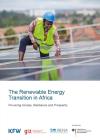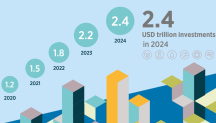

-
-
IRENA, KfW and GIZ (2021), The renewable energy transition in Africa, International Renewable Energy Agency, the German Development Bank and the Deutsche Gesellschaft für Internationale Zusammenarbeit, Abu Dhabi, Frankfurt and Bonn.
Copied
/-/media/Files/IRENA/Agency/Publication/2021/March/Renewable_Energy_Transition_Africa_2021.pdf
Copied
The Renewable Energy Transition in Africa
Newsletter
A renewables-based energy transition promises to deliver vast socio-economic benefits to countries across Africa, improving energy access, creating jobs and boosting energy security. To realise these benefits, African countries have an opportunity to leapfrog fossil fuel technologies to a more sustainable, climate-friendly power strategy aligned with the Paris Agreement and low-carbon growth.
The report is also available in French (français) and German (Deutsch)
The Renewable Energy Transition in Africa, jointly prepared by Germany's KfW Development Bank, Deutsche Gesellschaft für Internationale Zusammenarbeit (GIZ), and the International Renewable Energy Agency (IRENA) on behalf of the German Federal Ministry for Economic Cooperation and Development (BMZ), explores how African countries can achieve universal energy access within the 2030 Agenda timeframe and identifies four areas of action:
- Promote access to energy;
- De-risk and promoting private sector investments;
- Strengthen and modernise the grid;
- Support systemic innovation.
The study also explores the transformational potential of the electricity sector in five Africa countries: Ghana, Ivory Coast, Morocco, Rwanda and South Africa. Specifically developed by IRENA, country case studies show the real-life applicability of power sector transformation and demonstrates how countries can:
- Take advantage of the abundancy and competitiveness of renewables;
- Align ambitious renewable targets in energy and climate plans;
- Continue supporting the development of regional markets;
- Leverage renewables and distributed energy resources to achieve universal energy access;
- Develop tailored power sector transformation plans based on a systemic innovation approach;
- Build on policy frameworks for just and inclusive transitions.




